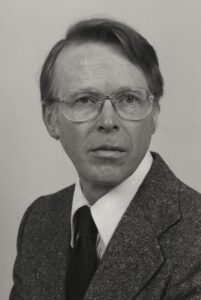
Dr. Kelly Clifton, a professor emeritus in the Department of Human Oncology who helped establish the department’s excellence in radiation biology and carcinogenesis and mentored scientists who went on to highly successful research careers, died on August 24, 2020 in Madison. He was 93.
Dr. Clifton earned his PhD in zoology/endocrinology at UW–Madison in 1955 and joined the UW Department of Radiology as a faculty member in 1959 and in 1975 joined the newly formed Department of Human Oncology. He specialized in radiation biology and helped establish the university’s graduate program in radiological sciences, which he then directed for many years. He also played an important role in creating the undergraduate biology core curriculum.
Dr. Clifton’s research focused on the measurement of the toxic effects of radiation and chemical toxicants on cells. He did groundbreaking work on what he called mammary “clonogens,” which later became known as stem cells. He served as research director of the Radiation Effects Research Foundation, a U.S.-Japan cooperative research institute that investigates the health effects of atomic bomb radiation and helped establish the Department of Human Oncology’s expertise in radiation biology and radiation carcinogenesis.
“He was a superb scientist, and many of his trainees over the years have gone on to establish accomplished careers of their own. They bear testament to his superb mentorship,” says Dr. Mark Ritter, professor emeritus of human oncology, who was a faculty colleague of Dr. Clifton.
Among his students were Drs. Eugene Gerner, Michael Gould, Tim Mulcahy, and Randy Jirtle. Dr. Jirtle, a specialist in epigenetics and professor at North Carolina State University, was an undergraduate majoring in nuclear engineering when Dr. Clifton gave a series of guest lectures on the biological effects of radiation.
“I was absolutely amazed. It just really caught my attention, and I decided to ask him if I could work with him one summer to see what it was like to do biological research,” Dr. Jirtle recalls.
That summer led Dr. Jirtle to study radiation biology in Dr. Clifton’s lab as a graduate student.
“Kelly did not have a lot of graduate students, but all those he mentored did really well. He allowed us the opportunity to fail and to play. As a consequence we became good at troubleshooting and figuring out which projects are worth pursuing,” Dr. Jirtle says. “We also had a great time. He created an atmosphere that was really enjoyable. We felt like we were on a winning team.”
Dr. Clifton, who retired in 1997, also provided guidance and support to faculty colleagues.
“Kelly was a positive, upbeat person. And I am particularly grateful for the advice and assistance he provided me as a new faculty member in 1988,” Dr. Ritter says. “He also incorporated me early into leadership roles in teaching and as the director of the UW Carbone Cancer Center Flow Cytometry Shared Service, activities that enriched my future career at UW.”
Dr. Bhudatt Paliwal, professor emeritus of human oncology, also benefited from Dr. Clifton’s guidance. “During the days of my appointment on the tenure track, there were no mentor committees to guide junior faculty. There were six or seven physics faculty senior to me. I could not bring myself to open up to them and seek guidance. Dr. Clifton was very soft spoken and easy to approach. I was fortunate to have him to look up to and receive his guidance to map out my academic path.”